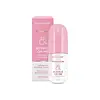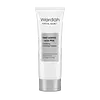What's inside
What's inside
 Key Ingredients
Key Ingredients

 Benefits
Benefits

 Concerns
Concerns

 Ingredients Side-by-side
Ingredients Side-by-side

Water
Skin ConditioningDisodium Laureth Sulfosuccinate
CleansingCocamidopropyl Betaine
CleansingDisiloxane
Skin ConditioningGlycerin
HumectantMethyl Perfluorobutyl Ether
SolventSalicylic Acid
MaskingAllantoin
Skin ConditioningCentella Asiatica Extract
CleansingCitrus Limon Fruit Extract
MaskingSaccharomyces/Honey Ferment Filtrate
Skin ConditioningSodium PCA
HumectantAloe Barbadensis Leaf Juice
Skin ConditioningChlorphenesin
AntimicrobialPhenoxyethanol
Preservative7-Dehydrocholesterol
Emulsion StabilisingTocopheryl Acetate
AntioxidantRetinyl Palmitate
Skin ConditioningCinnamomum Zeylanicum Bark Extract
AntimicrobialPanthenol
Skin ConditioningWater, Disodium Laureth Sulfosuccinate, Cocamidopropyl Betaine, Disiloxane, Glycerin, Methyl Perfluorobutyl Ether, Salicylic Acid, Allantoin, Centella Asiatica Extract, Citrus Limon Fruit Extract, Saccharomyces/Honey Ferment Filtrate, Sodium PCA, Aloe Barbadensis Leaf Juice, Chlorphenesin, Phenoxyethanol, 7-Dehydrocholesterol, Tocopheryl Acetate, Retinyl Palmitate, Cinnamomum Zeylanicum Bark Extract, Panthenol
Water
Skin ConditioningGlycerin
HumectantAcrylates Copolymer
Cocamidopropyl Betaine
CleansingPropylene Glycol
HumectantSodium Laureth Sulfate
CleansingPotassium Cocoyl Glycinate
Decyl Glucoside
CleansingSodium Lauroyl Methyl Isethionate
CleansingSodium PCA
HumectantPotassium Cocoate
EmulsifyingSodium Chloride
MaskingPhenoxyethanol
PreservativeSodium Hydroxide
BufferingParfum
MaskingDMDM Hydantoin
PreservativeGluconolactone
Skin ConditioningZea Mays Starch
AbsorbentMannitol
HumectantMicrocrystalline Cellulose
AbsorbentEthylhexylglycerin
Skin ConditioningDisodium EDTA
Trisodium Ethylenediamine Disuccinate
Sodium Benzoate
MaskingLactic Acid
BufferingGlycolic Acid
BufferingMica
Cosmetic ColorantCitric Acid
BufferingCitrus Aurantium Dulcis Fruit Extract
MaskingHydroxypropyl Starch Phosphate
Tocopheryl Acetate
AntioxidantLeontopodium Alpinum Extract
Skin ConditioningMalic Acid
BufferingSaccharum Officinarum Extract
MoisturisingTartaric Acid
BufferingPotassium Sorbate
PreservativeAcer Saccharum Extract
Skin ConditioningCitrus Limon Fruit Extract
MaskingVaccinium Myrtillus Fruit Extract
Skin ConditioningCI 77891
Cosmetic ColorantCI 77499
Cosmetic ColorantWater, Glycerin, Acrylates Copolymer, Cocamidopropyl Betaine, Propylene Glycol, Sodium Laureth Sulfate, Potassium Cocoyl Glycinate, Decyl Glucoside, Sodium Lauroyl Methyl Isethionate, Sodium PCA, Potassium Cocoate, Sodium Chloride, Phenoxyethanol, Sodium Hydroxide, Parfum, DMDM Hydantoin, Gluconolactone, Zea Mays Starch, Mannitol, Microcrystalline Cellulose, Ethylhexylglycerin, Disodium EDTA, Trisodium Ethylenediamine Disuccinate, Sodium Benzoate, Lactic Acid, Glycolic Acid, Mica, Citric Acid, Citrus Aurantium Dulcis Fruit Extract, Hydroxypropyl Starch Phosphate, Tocopheryl Acetate, Leontopodium Alpinum Extract, Malic Acid, Saccharum Officinarum Extract, Tartaric Acid, Potassium Sorbate, Acer Saccharum Extract, Citrus Limon Fruit Extract, Vaccinium Myrtillus Fruit Extract, CI 77891, CI 77499
 Reviews
Reviews

Ingredients Explained
These ingredients are found in both products.
Ingredients higher up in an ingredient list are typically present in a larger amount.
Citrus Limon Fruit Extract comes from lemons. While lemon extract is exfoliating and antimicrobial, it can also cause skin sensitivity.
Lemons contains antioxidants, which may help with anti-aging. They are also rich in citric acid, an AHA.
And of course, lemons are rich in Vitamin C. Vitamin C helps with skin-brightening and increasing collagen production.
The acidity of lemons may work as an astringent for acne.
However, lemons can also cause skin sensitivity due to its limonene content. It can also increase photosensitivity, or sensitivity to the sun.
This ingredient is also used to add a lemon scent to products.
Learn more about Citrus Limon Fruit ExtractCocamidopropyl Betaine is a fatty acid created by mixing similar compounds in coconut oil and dimethylaminopropylamine, a compound with two amino groups.
This ingredient is a surfactant and cleanser. It helps gather the dirt, pollutants, and other impurities in your skin to be washed away. It also helps thicken a product and make the texture more creamy.
Being created from coconut oil means Cocamidopropyl Betaine is hydrating for the skin.
While Cocamidopropyl Betaine was believed to be an allergen, a study from 2012 disproved this. It found two compounds in unpure Cocamidopropyl Betaine to be the irritants: aminoamide and 3-dimethylaminopropylamine. High-grade and pure Cocamidopropyl Betaine did not induce allergic reactions during this study.
Learn more about Cocamidopropyl BetaineGlycerin is already naturally found in your skin. It helps moisturize and protect your skin.
A study from 2016 found glycerin to be more effective as a humectant than AHAs and hyaluronic acid.
As a humectant, it helps the skin stay hydrated by pulling moisture to your skin. The low molecular weight of glycerin allows it to pull moisture into the deeper layers of your skin.
Hydrated skin improves your skin barrier; Your skin barrier helps protect against irritants and bacteria.
Glycerin has also been found to have antimicrobial and antiviral properties. Due to these properties, glycerin is often used in wound and burn treatments.
In cosmetics, glycerin is usually derived from plants such as soybean or palm. However, it can also be sourced from animals, such as tallow or animal fat.
This ingredient is organic, colorless, odorless, and non-toxic.
Glycerin is the name for this ingredient in American English. British English uses Glycerol/Glycerine.
Learn more about GlycerinPhenoxyethanol is a preservative that has germicide, antimicrobial, and aromatic properties. Studies show that phenoxyethanol can prevent microbial growth. By itself, it has a scent that is similar to that of a rose.
It's often used in formulations along with Caprylyl Glycol to preserve the shelf life of products.
Sodium PCA is the sodium salt of pyroglutamic acid. It is naturally occurring in our skin's natural moisturizing factors where it works to maintain hydration.
The PCA stands for pyrrolidone carboxylic acid, a natural amino acid derivative.
This ingredient has skin conditioning, anti-inflammatory, and humectant properties. Humectants help hydrate your skin by drawing moisture from the air. This helps keep your skin moisturized.
Learn more about Sodium PCATocopheryl Acetate is AKA Vitamin E. It is an antioxidant and protects your skin from free radicals. Free radicals damage the skin by breaking down collagen.
One study found using Tocopheryl Acetate with Vitamin C decreased the number of sunburned cells.
Tocopheryl Acetate is commonly found in both skincare and dietary supplements.
Learn more about Tocopheryl AcetateWater. It's the most common cosmetic ingredient of all. You'll usually see it at the top of ingredient lists, meaning that it makes up the largest part of the product.
So why is it so popular? Water most often acts as a solvent - this means that it helps dissolve other ingredients into the formulation.
You'll also recognize water as that liquid we all need to stay alive. If you see this, drink a glass of water. Stay hydrated!
Learn more about Water